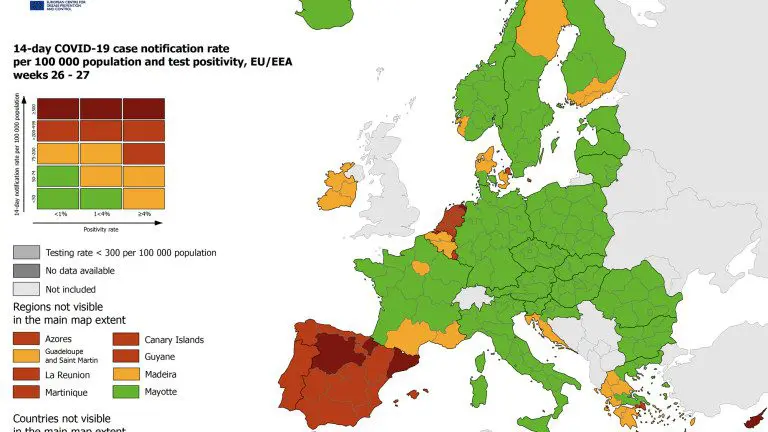The map of Europe is turning orange again, as large parts of Greece, France, Croatia and Denmark are no longer green in the latest update of the European Center for Disease Prevention and Control (ECDC), the Brussels Times reported.
According to the latest update, almost all of Greece and Denmark, the Mediterranean coasts of Croatia and France and the French capital Paris have turned orange again on the ECDC map, meaning the risk of infection is now considered “moderate” by Belgian authorities.
In Greece, this applies to the South Aegean Sea, Western Macedonia, Epirus, Thessaly, the Ionian Islands, Western Greece and the Peloponnese. The Attica region and the island of Crete are even being added to the red regions, indicating a “high” risk of infection, as of Wednesday, July 21st.
In France, the departments of Guadeloupe, Ile-de-France, Languedoc-Roussillon, Midi-Pyrénées and Provence-Alpes-Côte d’Azur have turned orange for the first time in a long time.
The Croatian area of Adriatic Croatia, which is almost the entire coastal region, is also orange again.
In addition, as the Spanish regions of Galicia, Castilla-La Mancha and Melilla have become red, the whole of Spain is now a red zone for tourists from Belgium.
The Portuguese islands The Azores are now also turning red, along with the whole of mainland Portugal, leaving only the island of Madeira as an orange zone.
Malta and Andorra will turn completely red on Wednesday, after the Netherlands and Luxembourg have already been painted red since Saturday.
All passengers wishing to enter Belgium after at least 48 hours abroad must complete the Passenger Location Form (PLF), regardless of the color code of the area from which they are returning. As of July 1, color codes no longer matter to people who have been fully vaccinated or have recently recovered from a Covid-19 infection, as they do not have to be tested or quarantined on their return to Belgium, according to Belgian authorities.
The only exception to this rule applies to fully vaccinated passengers returning from an area considered by Belgium to be a “very high risk country”, but there are currently no EU countries on this list.
Those returning from the red zone without being fully vaccinated or holding a reimbursement certificate should be tested on day 1 or 2 after being collected and quarantined until a negative test result.
The European Center for Disease Prevention and Control (ECDC) expects to see 420 cases per 100,000 people in the week ending August 1, Deutsche Welle reports.
The agency, which covers the European Union, as well as Norway and Iceland and Liechtenstein, expects the figure to rise to more than 620 new cases per 100,000 population for the week ending 8 August.
“The current continuing deterioration of the epidemiological situation in many countries is expected to continue, given the rapid growth of the Delta option,” the ECDC report said.
The number of hospitalizations and deaths is expected to increase at a much slower pace, ECDC said, especially thanks to the vaccination campaign.
The number of COVID-19-related deaths is expected to exceed the threshold of 10 per million, up from 6.8 last week.
ECDC forecasts an increase in cases in 20 countries with an increase in deaths in nine of them. These are Cyprus, Greece, Lithuania, Luxembourg, Malta, the Netherlands, Portugal, Slovenia and Spain.
Younger people are among the last to be offered vaccinations because they are at lower risk of death or serious illness than older people.
The Stockholm-based agency warned last month that the Delta option appears to be to blame for 90% of new cases by the end of August.
As a result, the ECDC stated that it was essential for Europe to speed up vaccination campaigns so as to fill the gaps in immunity as quickly as possible.







